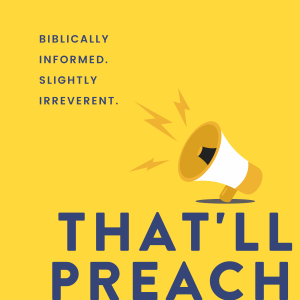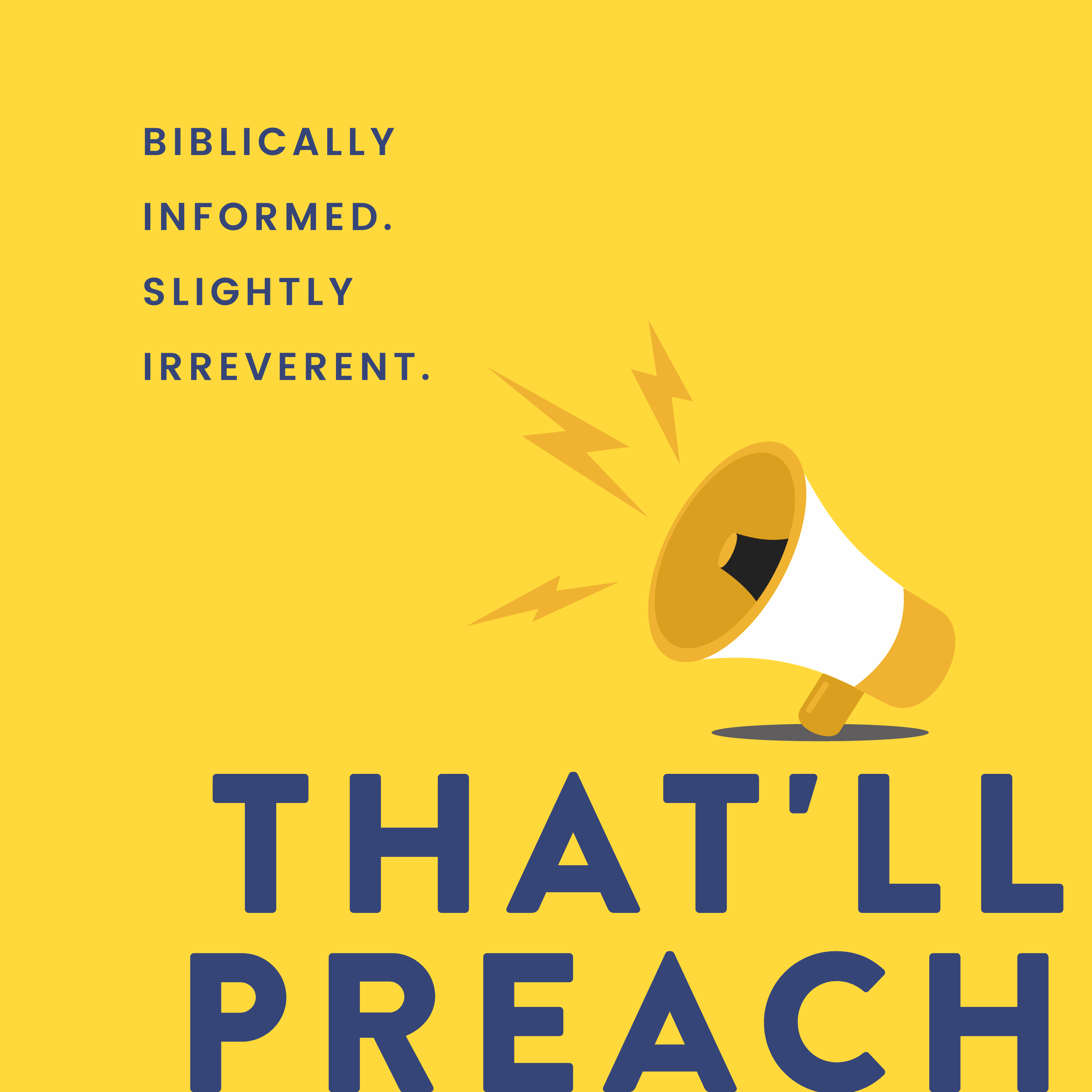Episodes

Tuesday Oct 31, 2023
Tuesday Oct 31, 2023
We’re starting a new series on Protestantism in honor of Reformation day. In this episode we discuss the appeal of Roman Catholicism in a post-Christian age and the necessity of the Protestant Reformation. We talk about common misunderstandings Protestants have of Catholics as well as ways Catholics misrepresent Protestants. We also talk about the most divisive doctrine in Christendom: the Papacy.
Website: thatllpreach.io
Instagram: @thatllpreachpodcast
Show Notes
The Real Difference Between Catholics and Protestants with Guillaume Bignon
Catholics vs. Protestants on the Bible with Dr. Gregg Allison

Tuesday Oct 24, 2023
Leading Through Church Conflict with Steven Lee
Tuesday Oct 24, 2023
Tuesday Oct 24, 2023
We welcome Pastor Steven Lee of the North Church in Minneapolis, MI to share his insights on the subject of conflict within the church. We discuss the importance of feedback among leaders and staff as well as the importance of having a thick skin when engaging difficult topics. Steven shares his own experience of leading a large church through the complexities of race, politics, COVID, and an assortment of other social issues facing the church. We also talk about the tension of balancing thoughtful listening with decisive leadership in a polarized age. Steven also shares how he deals with criticism on a personal level. On the one hand, you cannot let people’s opinions dictate your decisions, but on the other hand leaders must develop self-awareness of their own shortcomings and blind spots. If you’re wondering how Christians can maintain unity while also hold to strong opinions then this is the episode for you.
Website: thatllpreach.io
Instagram: @thatllpreachpodcast

Tuesday Oct 17, 2023
Herman Bavinck and the Modern World with Dr. Gray Sutanto
Tuesday Oct 17, 2023
Tuesday Oct 17, 2023
Dr. Gray Sutanto of Reformed Theological Seminary in Washington DC joins us to discuss the relevance of Herman Bavinck's theology of revelation in today’s post-Christian world.
Herman Bavinck, the renowned Dutch theologian of the late 19th and early 20th centuries, has much to teach us about divine revelation in a contemporary context. Dr. Sutanto breaks down Bavinck's rich theological ideas and demonstrates how they can enlighten our understanding of God's revelation amidst the complexities of our secular society.
Dr. Sutanto elucidates Bavinck's views on revelation, encompassing the interplay of nature and grace, the authority of Scripture, and the role of human reason in grasping divine truth. By linking Bavinck's theological wisdom to present-day challenges and questions, this episode offers a fresh perspective on the enduring relevance of his ideas in our ever-changing world.
Website: thatllpreach.io
Instagram: @thatllpreachpodcast
Show Notes
The Wonderful Works of God by Herman Bavinck
Philosophy of Revelation by Herman Bavinck
Neo-Calvinism: A Theological Introduction by Dr. Gray Sutanto
Bavinck’s Christian Worldview lecture by Dr. Gray Sutanto

Tuesday Oct 10, 2023
American History and the End Times with Dr. James Strasburg
Tuesday Oct 10, 2023
Tuesday Oct 10, 2023
We are privileged to have Dr. James Strasburg as our guest to help explore a compelling facet of American history: the profound influence of theological perspectives concerning the "end times" or "eschatology."
Our discussion commences with a historical overview of the theological landscape. During America's nascent years, the prevailing theological outlook was one of postmillennialism, characterized by an optimism regarding the widespread propagation of Christianity throughout the nation. This optimistic sentiment was deeply ingrained in the foundational period of American history.
However, as the world was embroiled in the aftermath of two World Wars, a significant theological paradigm shift occurred. American Christian sentiment veered toward dispensational premillennialism, a theological perspective characterized by a more pessimistic view of Christianity's prospects in the current era.
Additionally, our conversation delves into the ramifications of the Fundamentalist/Modernist controversy, which amplified eschatological fervor among Christians. This controversy centered on the anticipation of the second coming of Christ and spurred fervent efforts to evangelize the nations.
Throughout our dialogue, Dr. Strasburg provides invaluable insights, navigating the intricate waters of history with meticulous attention to specific historical events, influential figures, and cultural transformations that have profoundly shaped American history.
Website: thatllpreach.io
Instagram: @thatllpreachpodcast
Show Notes
God’s Marshall Plan: American Protestants and the Struggle for the Soul of Europe by James D. Strasburg

Tuesday Oct 03, 2023
God’s Promise of Blessing with Mike Glodo
Tuesday Oct 03, 2023
Tuesday Oct 03, 2023
Mike Glodo of Reformed Theological Seminary, Orlando joins us to discuss his new book The Lord Bless You and Keep You: The Promise of the Gospel in the Aaronic Blessing. We discuss the role of the benediction in the church service and how it assures God’s people of his love for them. The Aaronic blessing also contains within it a rich biblical theology of “faces” and how our eternal hope rests in seeing Christ face to face. Mike provides helpful insights from decades of pastoral ministry about how to apply these words of blessing to Christians in periods of doubt, trial, and difficulty. Join us for this powerful episode that will change the way you understand what it means to be “blessed”.
Show Notes
The Lord Bless You and Keep You: The Promise of the Gospel in the Aaronic Blessing by Mike Glodo

Tuesday Sep 26, 2023
Facing the Fear of Death with Dr. Guy Waters
Tuesday Sep 26, 2023
Tuesday Sep 26, 2023
Our special guest, Dr. Guy Waters, a distinguished theologian and professor at Reformed Theological Seminary, brings his deep insights and extensive knowledge to the subject of death. Dr. Waters is a widely respected figure in the world of Reformed theology, known for his thoughtful and compassionate approach to complex spiritual matters.
In this podcast episode, we delve into the profound topic of "Facing the Fear of Death" and explore how Christians confront this universal fear with unwavering courage and hope. Dr. Waters shares key insights into how Christians approach death without fear. Drawing from his extensive biblical scholarship, he discusses the foundational Christian belief in eternal life through faith in Christ and the hope that transcends the grave. We'll explore the practical aspects of living out this faith in the face of mortality, including the importance of community and the power of prayer.
Join us for a conversation that will not only challenge your perspective on death but also inspire you to live with greater purpose and confidence. Discover how Christians, led by their faith, navigate the journey from life to eternity, proving that even in the face of death, there is hope, peace, and a fearless trust in the divine plan.
Show Notes
Facing the Last Enemy by Dr. Guy Waters

Tuesday Sep 19, 2023
Transforming Your Life Through Spiritual Disciplines with Rev. Michael Petty
Tuesday Sep 19, 2023
Tuesday Sep 19, 2023
Rev. Michael Petty of St. Peter's Anglican church joins us for an informative podcast on spiritual formation. We discuss a variety of topics from developing a life of prayer, reading Scripture in community, engaging Christians with their spiritual gifts, and the causes and cures for pastoral burnout. Michael also shares personal anecdotes of the ways in which spiritual disciplines of prayer, Scripture reading, and fellowship formed him at key moments in his life. If you feel "stuck" in your spiritual life and need guidance this podcast episode is for you.

Tuesday Sep 12, 2023
Can We Trust the Old Testament? with Dr. Peter Lee
Tuesday Sep 12, 2023
Tuesday Sep 12, 2023
In this episode of That'll Preach we take an intriguing journey into the heart of biblical scholarship to scrutinize the reliability of the Old Testament. Join us as we engage in a captivating conversation with distinguished Old Testament scholar, Professor Peter Lee, from RTS (Reformed Theological Seminary).
We delve deep into the questions that have sparked both curiosity and debate for centuries: "Can We Trust the Old Testament?" Professor Lee brings his extensive expertise to the forefront, shedding light on the historical context, authorship, and the concrete reliability of the Old Testament scriptures.
Discover the answers to pressing questions, including:
- What is the role of oral tradition in the transmission of the Old Testament?
- Why are the Dead Sea Scrolls so significant?
- How do we understand authorship in the Old Testament?
- How do we gain confidence in the historicity of the Old Testament? Were details embellished?
Whether you're a devout believer seeking to deepen your faith or a curious skeptic eager to explore the historical credibility of these sacred writings, this episode offers a balanced and well-informed examination that underscores the unwavering reliability of the Old Testament.

Tuesday Sep 05, 2023
Why Preaching Matters with Les Newsom
Tuesday Sep 05, 2023
Tuesday Sep 05, 2023
Pastor Les Newsom of Christ Presbyterian Church in Oxford, Mississippi joins us to talk about the importance of preaching in the formation of Christians in the church. He goes into the way he thinks through connecting the Bible with the congregation though imagination and rhetoric. He also speaks to the need for preaching in the midst of an increasingly hostile world towards Christianity. This episode is for anyone who wants to grow in their preaching and challenge themselves to be better exegetes of the Bible and the world.
Show Notes
Check out Les Newsom's sermons at cpcoxford.org

Tuesday Aug 29, 2023
Has the Church Replaced Israel? with Dr. Gerald McDermott
Tuesday Aug 29, 2023
Tuesday Aug 29, 2023
Welcome to another episode of "That'll Preach"! In this thought-provoking installment, we dive into a topic that has ignited centuries of debate and reflection: "Has the Church Replaced Israel?" Join us as we explore the historical and theological dimensions of this complex issue, shedding light on its significance within Christianity.
Dr. McDermott, a renowned theologian, offers his profound insights into the intricate relationship between the Church and Israel.
Our conversation begins by tracing the roots of this theological inquiry back to the early days of the Church. We examine how interpretations have evolved over time and consider whether the Church, in embracing the teachings of Christ, has inherited the promises originally bestowed upon Israel. We also delve into scriptural passages and historical records as we dissect the contrasting viewpoints that have shaped this ongoing discourse.
The heart of our discussion centers around the letters of the apostle Paul. Dr. McDermott guides us through Paul's intricate theological framework, helping us decipher whether Paul intended to establish a seamless continuity between the Church and Israel or if his message carried deeper complexities.
Dr. McDermott also turns our gaze towards the future: What do the various theological perspectives on the Church-Israel relationship mean for eschatology—the study of end times? What role does modern-day Israel play in God's redemptive purposes? McDermott helps us uncover how these interpretations influence believers' expectations of the ultimate fulfillment of God's plan.
Whether you're a seasoned theologian or a curious seeker of knowledge, this discussion with Dr. McDermott is sure to broaden your horizons and deepen your understanding of one of Christianity's most enduring debates. Don't miss out—hit that play button and join us in exploring the past, present, and future of this compelling theological discourse!
"That'll Preach" is available on Apple Podcasts and Spotify. Remember to subscribe, leave a review, and share
Show Notes
Israel Matters: Why Christians Must Think Differently About the People and the Land by Gerald McDermott
Understanding the Jewish Roots of Christianity edited by Gerald McDermott
Jewish New Testament Commentary by David Stern

